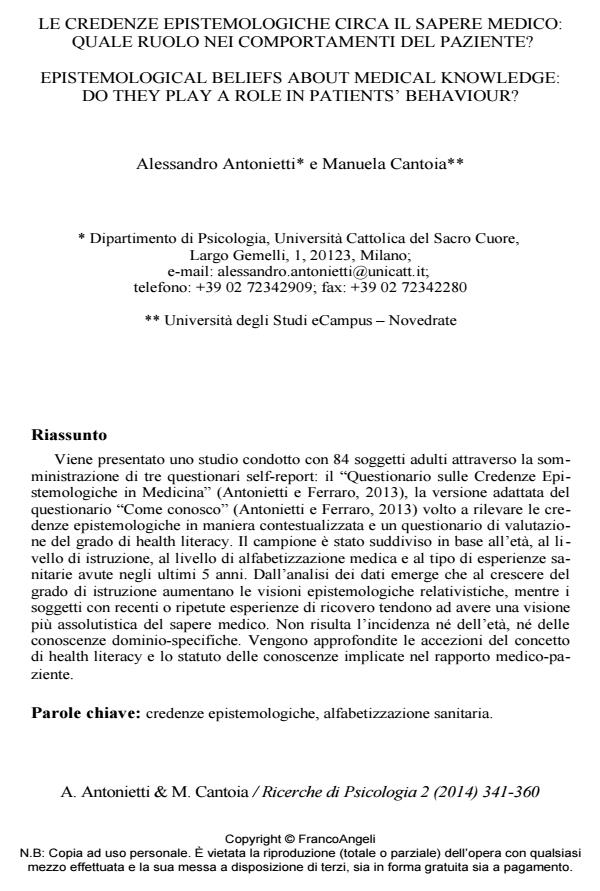Le credenze epistemologiche circa il sapere medico: Quale ruolo nei comportamenti del paziente?
Titolo Rivista RICERCHE DI PSICOLOGIA
Autori/Curatori Alessandro Antonietti, Manuela Cantoia
Anno di pubblicazione 2015 Fascicolo 2014/2
Lingua Italiano Numero pagine 20 P. 341-360 Dimensione file 226 KB
DOI 10.3280/RIP2014-002010
Il DOI è il codice a barre della proprietà intellettuale: per saperne di più
clicca qui
Qui sotto puoi vedere in anteprima la prima pagina di questo articolo.
Se questo articolo ti interessa, lo puoi acquistare (e scaricare in formato pdf) seguendo le facili indicazioni per acquistare il download credit. Acquista Download Credits per scaricare questo Articolo in formato PDF

FrancoAngeli è membro della Publishers International Linking Association, Inc (PILA), associazione indipendente e non profit per facilitare (attraverso i servizi tecnologici implementati da CrossRef.org) l’accesso degli studiosi ai contenuti digitali nelle pubblicazioni professionali e scientifiche.
Viene presentato uno studio condotto con 84 soggetti adulti attraverso la somministrazione di tre questionari self-report: il "Questionario sulle Credenze Epistemologiche in Medicina" (Antonietti e Ferraro, 2013), la versione adattata del questionario "Come conosco" (Antonietti e Ferraro, 2013) volto a rilevare le credenze epistemologiche in maniera contestualizzata e un questionario di valutazione del grado di health literacy. Il campione e stato suddiviso in base all’eta, al li - vello di istruzione, al livello di alfabetizzazione medica e al tipo di esperienze sanitarie avute negli ultimi 5 anni. Dall’analisi dei dati emerge che al crescere del grado di istruzione aumentano le visioni epistemologiche relativistiche, mentre i soggetti con recenti o ripetute esperienze di ricovero tendono ad avere una visione piu assolutistica del sapere medico. Non risulta l’incidenza ne dell’eta, ne delle conoscenze dominio-specifiche. Vengono approfondite le accezioni del concetto di health literacy e lo statuto delle conoscenze implicate nel rapporto medico-paziente.
Parole chiave:Credenze epistemologiche, alfabetizzazione sanitaria.
Alessandro Antonietti, Manuela Cantoia, Le credenze epistemologiche circa il sapere medico: Quale ruolo nei comportamenti del paziente? in "RICERCHE DI PSICOLOGIA " 2/2014, pp 341-360, DOI: 10.3280/RIP2014-002010